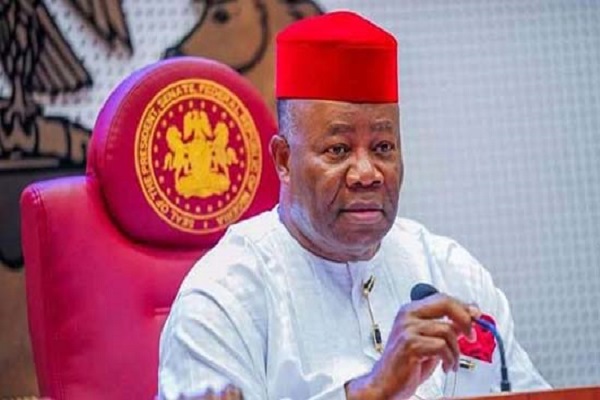
- Says Nigeria never had such plans since the nation’s founding fathers
The Senate President, Senator Godswill Akpabio, has urged the 10th Senate to support President Bola Tinubu’s development plans for the country, saying that Nigeria never had such audacious plans since the days of the nation’s founding fathers.
Akpabio stated this on Thursday while speaking at the Senate retreat on Fiscal Policy and Tax Reforms organised by the National Institute of Legislative and Democratic Studies, held at Four Point by Sheraton Hotel in Ikot Ekpene Local Government Area of Akwa Ibom State.
He said, “Today, more than ever before we must come together in optimism to toe the road map of Mr. President and where we consider that changes may be appropriate, work with the executive to perfect the document.
“Let us follow the plan before us. The founding fathers of our nation – Dr. Nnamdi Azikiwe, Chief Obafemi Owolowo, Sir Ahmadu Bello, etc., had and followed a plan of development, and Nigeria, in their days, occupied a place of pride in the comity of nations.
“Since then, we have not had the kind of elaborate plan put forward by Mr. President and which targets growth in critical sectors of our economy and seeks to remove wastages in our economic cycle.
“Let us provide the launching pad for this audacious plan and acquit ourselves as patriots and worthy representatives of our people.”
Akpabio noted the significance of managing public expenditure, adding that the renewed hope agenda of Tinubu is one that shows good economic growth.
“Every plan, no matter how lofty and noble, needs to be financed. That is why we need to be taught public expenditure management, fiscal policy and tax reforms.
“Fortunately, the renewed hope plan is strong on the economic side. It proposes a ten per cent economic growth, which experts claim is achievable.
“It singles out the digital economy as a quick win for foreign exchange and job creation. We should note that Nigeria is the seventh largest internet-using country in the world with an estimated number of 104.4 million users,” Akpabio said.
Declaring the retreat open, Tinubu said it was unacceptable that 65 per cent of Nigerians, representing 84 million people were multi-dimensionally poor.
The president, who was represented by the Minister of Finance and Coordinating Minister of the Economy, Mr. Wale Edun, said he was committed to making Nigeria’s economy grow from the current three per cent.
“My ambition, commitment and objective is to make life better for all Nigerians. It is unacceptable that we are quoted as having 65 per cent of the population, 84 million people are found as multi-dimensionally poor.
“The antidote to this is that this government is committed to doing all we can to make the Nigerian economy grow and achieve rapid, sustained and inclusive growth.
“I cannot do this alone. There has to be a team network and of course legislators. The Senators have a key role to play.
“At this time when we are considering the medium-term economic framework and fiscal sustainability programme, it is topical and timely that we should be having this retreat.”
On his part, the deputy senate president, Senator Barau Jibrin, said fiscal policy and tax reforms that guarantee the nation’s survival should be central to Nigeria’s policies and governance as long as it does not add to the economic woes of the citizens.
“Our job at this retreat is to contribute to the discourse on the needed Fiscal Policy and Tax Reforms, towards the realisation of the 8-point agenda of the executive arm of government.
“We are to identify the policies, reforms and other economic plans in tandem with the thinking of the executive arm of government,” he stated.
Also speaking, the Speaker, House of Representatives, Hon. Abbas Tajudeen said that the high revenue spent on debt servicing constrains the fiscal space for other developmental needs, adding that the multiplicity and duplication of taxes impact negatively the nation’s efficient tax system.
Tajudeen stated that the HOR was committed in its collaboration with the Senate to tackle the nation’s fiscal problems through the implementation of appropriate legislative frameworks and measures.
“The gap between the Federal Government’s revenue and expenses has grown four times larger between 2015 and 2021. In 2023, for instance, the expected budget deficit is over N10 trillion, which is mainly being funded through borrowing.
“Although our debt-to-GDP ratio remains relatively low compared to many countries, the proportion of revenue spent on debt servicing is high, which can constrain the fiscal space for other developmental needs.
“We in the 10th House of Representatives intend to work with the executive and stakeholders to improve the coherence of our tax system, both in terms of administration and operation. Accordingly, the fourth legislative priority in our legislative agenda is economic restructuring.
“We will use legislative measures to provide incentives on tax breaks to encourage innovations and for industries that have the potential for job creation and export growth,” he explained.
Akwa Ibom State Governor, Umo Eno, who was represented by his deputy, Senator Akon Eyakenyi, said the retreat shows the commitment of the 10th Senate in making laws for the economic prosperity and well-being of Nigerians.
In his welcome remarks, the Director-General, National Institute for Legislative and Democratic Studies, Prof. Abubakar Sulaiman, said as an institutional member of the committee on Fiscal Policy and Tax Reforms, NILDS shows the importance of the National Assembly to the socioeconomic agenda of Tinubu’s administration.
Sulaiman explained that the retreat’s focus on Fiscal Policy and Tax Reforms demonstrates the commitment of the National Assembly to align with fiscal and sectoral reforms.
He said, “In a broader perspective, permit me to note at this juncture that this retreat should be viewed as part of the ways and means of enhancing the knowledge and strengthening the technical capacity of senators in the discharge of your responsibilities generally, support the deepening of your knowledge and skills on public financial management and identifying how the Senate can support the committee on the Fiscal Policy and Tax Reforms.”





